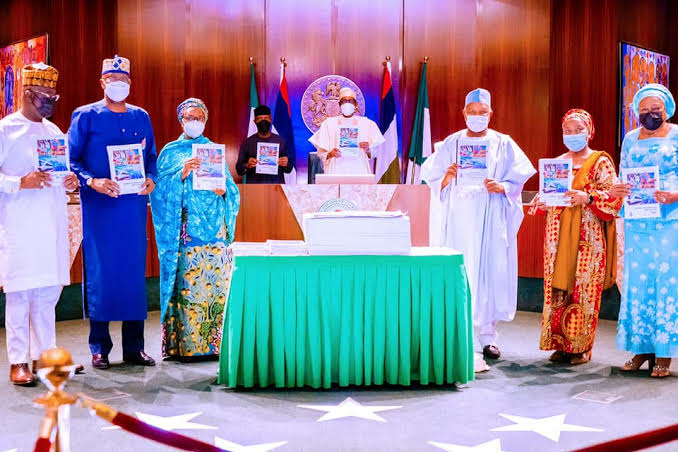Nigeria’s National Development Plan 2021-2025, which will succeed the Economic Recovery and Growth Plan, was launched by President Muhammadu Buhari (ERGP 2017-2020).
According to the News Agency of Nigeria (NAN), the president made the document public shortly before the start of the virtual meeting of the Federal Executive Council (FEC) on Wednesday at the Presidential Villa’s council chambers in Abuja.
The president was aided in presenting the document by Vice President Yemi Osinbajo, Secretary to the Government of the Federation, Boss Mustapha, Kebbi State Governor Atiku Bagudu, and Minister of Finance, Budget, and National Planning, Dr Zainab Ahmed.
Dr Zainab Ahmed, Minister of Finance, Budget, and National Planning, revealed at the event that the new document replaced the Economic Recovery and Growth Programme.
“The NDP 2021-2025 is designed as our medium-term Development Plan to succeed the Economic Recovery and Growth Plan (ERGP 2017-2020),” she said.
“The ERGP 2017–2020 aided the country’s exit from economic recession in 2017, and it maintained modest growth until the recent global economic challenges caused by the COVID-19 Pandemic.”
“The current difficulties are the result of many years of ineffective policies, fiscal leakages, and global economic phenomena.”
“This Administration is taking the necessary steps to fundamentally alter the structure of the economy and how government business is conducted in order to improve efficiency and effectiveness.”
She stated that the plan would assist Nigeria in achieving rapid development in the Science and Technology sectors.
“In 2019, the President graciously granted permission to my Ministry to develop a new national development plan to succeed both the ERGP 2017-2020.”
“It is critical to note that the Plan points to the type of Nigeria that we all want and encourages the use of science, technology, and innovation to drive growth,” she added.
The NDP 2021-2025, according to the minister, will assist Nigeria in achieving its agenda at the continental and global levels.
“I want to state unequivocally that this Plan is sufficiently comprehensive to accelerate the achievement of various regional and global Agendas, including the AU Agenda 2063, the ECOWAS Integration Agenda 2050, and the Sustainable Development Goals 2030.”
“In order to achieve the future we all desire, the Plan is designed to play a significant role in the product complexity space on a global scale, and it adopts measures to alleviate constraints that have prevented the economy from reaching its full potential, particularly in the product mapping space.”
“The Plan calls for the implementation of major infrastructure and other development projects across the six Geopolitical Zones, as well as the creation of opportunities for rural areas, to ensure balanced development and increased competitiveness,” she explained.
Ministers of Information and Culture, Lai Mohammed; Water Resources, Suleiman Adamu; Power, Abubakar Aliyu; Justice, Abubakar Malami; Industry, Trade and Investment, Niyi Adebayo, and Ministers of State for Education, Chukwuemeka Nwajiuba, and Budget and National Planning, Clement Agba were also present.

















Discussion about this post